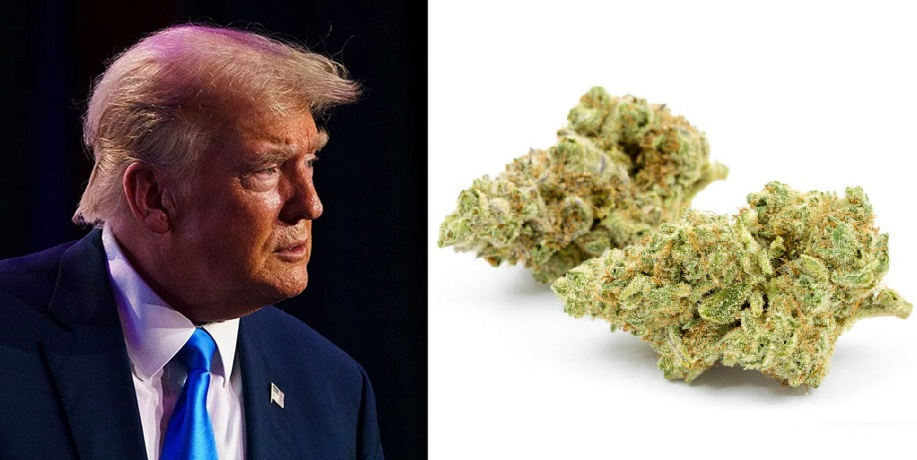The 2024 election resulted in a decisive victory for former President Donald Trump, who has a mixed but clearly evolving history when it comes to marijuana law reform. Here’s what we can expect out of the next four years.

During Trump’s previous term, while he did not support legalizing medical or recreational marijuana or back any specific marijuana legislation, his administration took a hands-off approach to state marijuana laws. His first attorney general, Jeff Sessions, did rescind the Obama-era Cole Memo, which had provided verbal assurances to state-legal marijuana businesses. However, this did not lead to Trump or his administration attempting to supersede state marijuana laws or interfere with legal marijuana programs.
Since leaving office in January 2021, Trump has shown considerable growth on the issue. Earlier this year, Trump endorsed Florida’s Amendment 3, an initiative to legalize recreational marijuana which was strongly opposed by Florida Governor Ron DeSantis. Soon after this endorsement, Trump gave his backing to the federal move to reschedule marijuana, as well as federal marijuana banking legislation.
The Most Likely Scenario
Although Trump has shown some evolution on marijuana legalization, House Speaker Mike Johnson and soon-to-be Senate Majority Leader John Thune remain firmly opposed to the idea (at least as of the time of publication). Unless Trump makes legalization or descheduling a major priority and expends significant political capital, it appears unlikely that legislation like the MORE Act or CAOA, which would deschedule and legalize marijuana, will be enacted.
However, this doesn’t mean reform is entirely off the table. For one, Trump’s support for rescheduling makes it unlikely his administration will halt the ongoing proceedings initiated under the Biden administration. While his pick for attorney general, Pam Bondi, could potentially complicate the move to Schedule III, it seems unlikely she would directly oppose Trump on this issue.
If the Trump Administration doesn’t get in the way of rescheduling, marijuana could be moved to Schedule III within the first few months of Trump’s second term. The move to Schedule III would allow medicines made from marijuana-derived compounds to be prescribed nationwide. Approval of these compounds would go through the FDA, which is overseen by the Department of Health. Trump’s pick to lead that department, RFK Jr., supports legalizing medical and recreational marijuana.
Additionally, a measure like the States Reform Act, which seeks to protect state marijuana laws and has bipartisan support, could gain traction under a Trump presidency and a Republican-led Congress. If not passed in the lame-duck session this year, the bipartisan SAFE Banking Act could also garner enough support for approval, given it has the backing of dozens of congressional Republicans as well as Trump.
The Optimistic Scenario
The best-case scenario is that Trump’s endorsement of various reform methods reflects a genuine shift in opinion and policy, leading him to advocate for change immediately upon assuming the presidency. If Thune and Johnson’s support for Trump is as strong as it seems, they might become more open to reforms beyond marijuana banking or state protection if it’s clear Trump is making it a priority. This could include descheduling marijuana, which could be framed as a states’ rights approach to appeal to conservatives. Trump could also push his administration to deschedule marijuana directly, similar to how Biden pushed for rescheduling, but this does appear less likely with Bondi as attorney general (though it is possible that she has also evolved on the issue).
2026
It’s also a possibility that reform might not occur until after the 2026 election. If Democrats take control of the House (not unlikely, as midterm elections often don’t favor the incumbent party), it would remove a significant obstacle in Speaker Mike Johnson. Although Democrats only managed to pass a marijuana research bill during Biden’s presidency (the first and alone standalone marijuana bill to ever be signed into law), the House did approve the MORE Act to deschedule marijuana while Trump was in office and Democrats controlled the chamber. However, it failed to advance in the evenly split Senate. Now that Trump has endorsed legalization, if the House were to pass a similar measure, it might enter the Senate with significantly more momentum, especially if Republicans know it has Trump’s support.
What Now
Putting all speculation aside, one thing is certain: the vast majority of American voters support ending marijuana prohibition. Polls released this year from YouGov, Fox News, and Gallup indicate that support for legalization among voters ranges between 66% and 69%. Whoever holds power could gain substantial goodwill among voters and deliver vast societal benefits by embracing meaningful federal marijuana reform.




